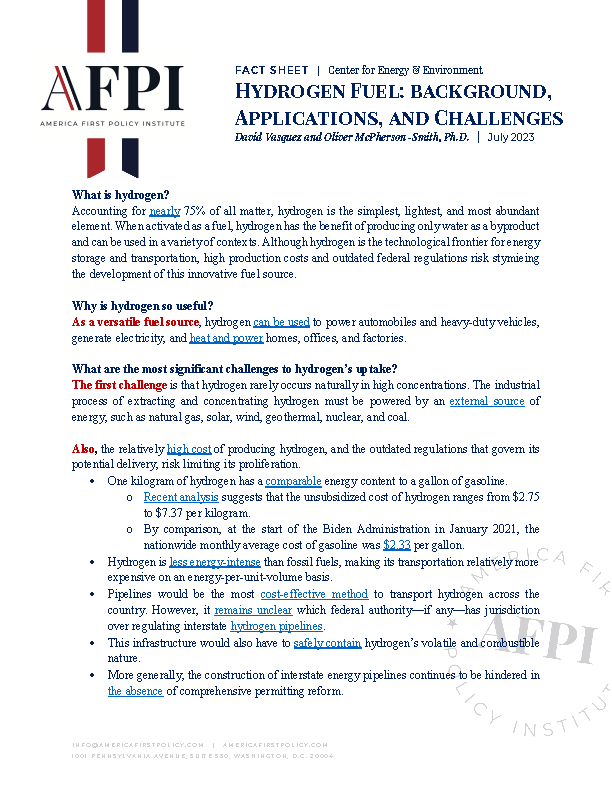FACT SHEET: Hydrogen Fuel: background, Applications, and Challenges
What is hydrogen?
Accounting for nearly 75% of all matter, hydrogen is the simplest, lightest, and most abundant element. When activated as a fuel, hydrogen has the benefit of producing only water as a byproduct and can be used in a variety of contexts. Although hydrogen is the technological frontier for energy storage and transportation, high production costs and outdated federal regulations risk stymieing the development of this innovative fuel source.
Why is hydrogen so useful?
As a versatile fuel source, hydrogen can be used to power automobiles and heavy-duty vehicles, generate electricity, and heat and power homes, offices, and factories.
What are the most significant challenges to hydrogen’s uptake?
The first challenge is that hydrogen rarely occurs naturally in high concentrations. The industrial process of extracting and concentrating hydrogen must be powered by an external source of energy, such as natural gas, solar, wind, geothermal, nuclear, and coal.
Also, the relatively high cost of producing hydrogen, and the outdated regulations that govern its potential delivery, risk limiting its proliferation.
- One kilogram of hydrogen has a comparable energy content to a gallon of gasoline.
- Recent analysis suggests that the unsubsidized cost of hydrogen ranges from $2.75 to $7.37 per kilogram.
- By comparison, at the start of the Biden Administration in January 2021, the nationwide monthly average cost of gasoline was $2.33 per gallon.
- Hydrogen is less energy-intense than fossil fuels, making its transportation relatively more expensive on an energy-per-unit-volume basis.
- Pipelines would be the most cost-effective method to transport hydrogen across the country. However, it remains unclear which federal authority—if any—has jurisdiction over regulating interstate hydrogen pipelines.
- This infrastructure would also have to safely contain hydrogen’s volatile and combustible nature.
- More generally, the construction of interstate energy pipelines continues to be hindered in the absence of comprehensive permitting reform.
Conclusion: Despite its high costs, hydrogen has enormous potential as a clean and flexible fuel. Clarifying the federal oversight of hydrogen pipelines, implementing appropriate safety rules, and enacting comprehensive permitting reform would all support development of the hydrogen industry, while helping to level the playing field among energy sources.
